Tuesday, June 4, 2024. Annette’s News Roundup.
I think the Roundup makes people feel not so alone.
To read an article excerpted in this Roundup, click on its blue title. Each “blue” article is hyperlinked so you can read the whole article.
Please feel free to share.
Invite at least one other person to subscribe today! Here 👇 is the link to share for others to subscribe. https://buttondown.email/AnnettesNewsRoundup
Remember: when you share the Roundup, you are fighting Fascism and helping to bring about a Democratic victory in 2024.
_________________________________________________
Joe is always busy.
Israel has now offered a roadmap to an enduring ceasefire – and the release of all the hostages.
— President Biden (@POTUS) May 31, 2024
Yesterday, this proposal was transmitted by Qatar to Hamas.
Today, I want to lay out its terms for the world. pic.twitter.com/0cdypBP9wb
I’m so proud to be Jill Biden’s husband.
— President Biden (@POTUS) June 3, 2024
Happy Birthday, Jilly. pic.twitter.com/m7peeITBnL
Biden Plans Asylum Restrictions for Migrants.
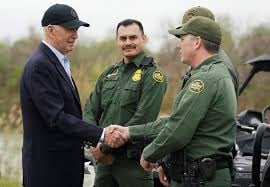
President Biden greets members of the U.S. Border Patrol at the U.S.-Mexico border in Brownsville, Tex., on Feb. 29.
President Biden is expected to sign an executive order . . . [today] allowing him to temporarily seal the U.S. border with Mexico to migrants when crossings surge. The move, which is all but certain to be challenged in court, would represent the single most restrictive border policy instituted by Biden, or any other modern Democrat.
The order would allow border officials to turn away migrants who claim asylum once border crossings exceed a certain threshold — restricting what has long been the surest way for migrants to stay in the U.S. White House officials have discussed setting the cutoff at 2,500 illegal crossings per day. If that level is set, the border would immediately be closed because roughly 3,500 migrants are currently apprehended each day.
Biden pushed Congress earlier this year to enact a similar policy into law, but Republicans thwarted the bill, saying it was not strong enough. Now under intense political pressure to address illegal migration, a top concern of voters ahead of the November election, the president has decided to use his executive authority.
Biden’s move underscores how the politics of immigration have tilted to the right. Many Democrats, including Biden, condemned a similar effort by Donald Trump in 2018 to restrict long-established protections for asylum seekers. Federal courts blocked his attempt. Now the former president’s harder line on immigration appears to be resonating more broadly. (New York Times)
_________________________________________________
Kamala is always busy.
I joined members of the LGBTQI+ community, advocates, and allies in Los Angeles to kick off Pride Month.
— Vice President Kamala Harris (@VP) June 1, 2024
Together, we are fighting for the freedom to be who you are and love who you love, openly and with pride. pic.twitter.com/s8n3YhxZF0
_________________________________________________
The man who would be dictator continues to make his goals clear.
Project 2025
Trump says he will “fire” America’s military generals and replace them with MAGA loyalists, echoing Project 2025 pic.twitter.com/kbEfzkllzQ
— Biden-Harris HQ (@BidenHQ) June 2, 2024
Project 2025
Trump’s goals aren’t “just” about the military. Project 2025 proposes to replace DOJ staff with staff who are “in line with Presidential Priorities.”
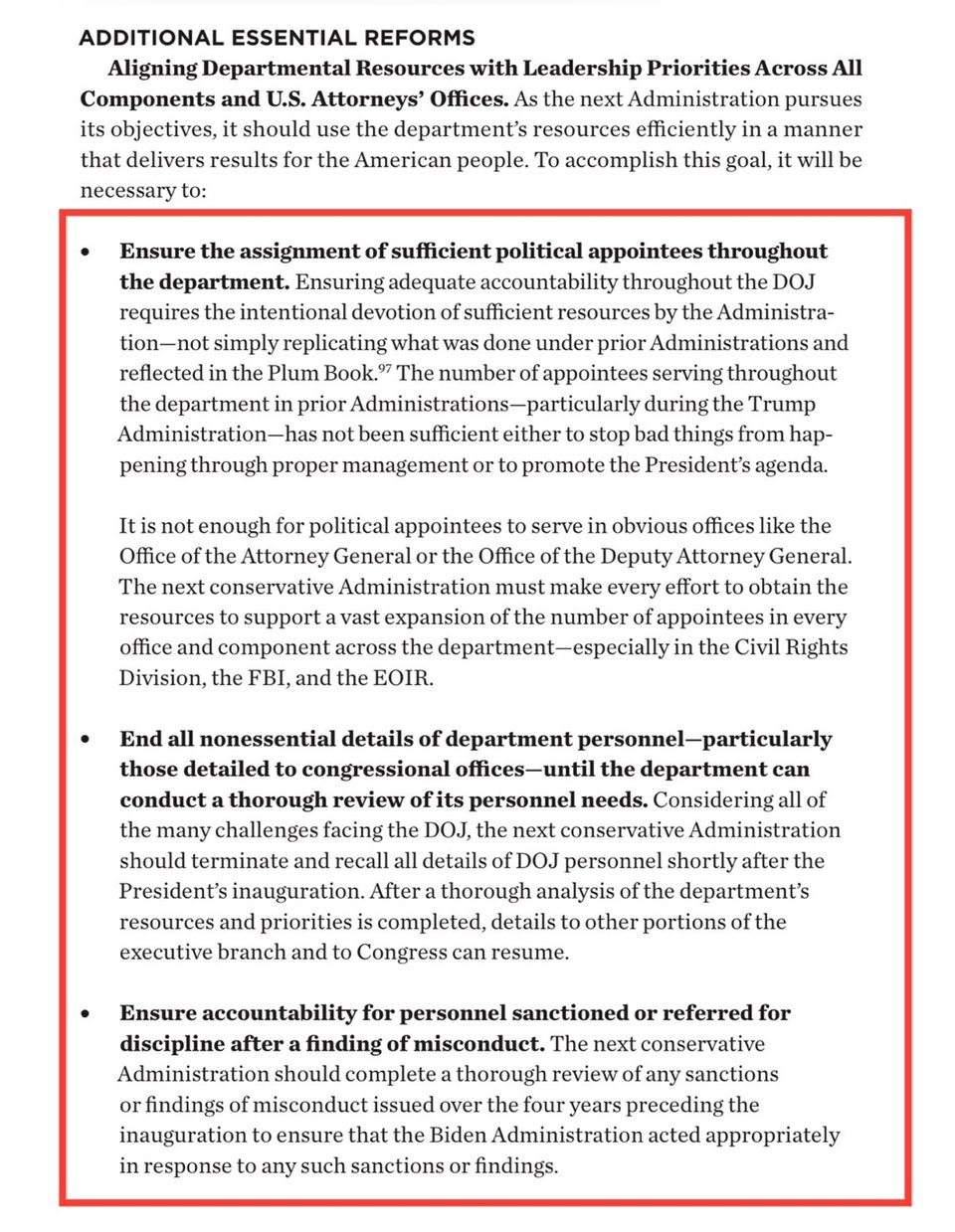
Simon Rosenberg, Hopium Chronicles.
Yes Trump Is A Bad Man, A Serial Criminal, But His Agenda Is Even Worse.
Yes, he is a rapist, a fraudster, a traitor and a felon. As bad as he is as a man - and he is really really bad - what he wants to do to the country is far worse and more consequential. Consider:
He wants Putin to win, the West to lose.
The border to be in chaos, and migrants to keep flowing into the country.
He wants the economy to crash, and his economic plan would slow growth, cause inflation to soar and all of us to lose.
He wants women, people of color to lose more freedoms and rights.
The planet to warm faster. 10 year olds to carry their rapist's baby to term, and for more women to die on an operating room table.
Tens of millions to lose their health insurance.
More dead kids in schools.
Verified rapists in positions of authority.
A restoration of pre-Civil Rights era white supremacy.
Big tax cuts for his donors, higher deficits and less for everyone else.
Books banned across the US.
Seniors to pay more for insulin and prescription drugs.
Foreign governments free to pollute our daily discourse and harass our citizens.
Teenagers to work night shifts in meat packing plants and not go to school.
The minimum wage to stay at $7.25.
Mass arrests and mass deportations of immigrants long settled in the US.
Insurrectionists to get pardoned.
To end American democracy for all time.
ProPublica - The media source that does its homework.
Trump Witnesses Have Received Financial Benefits From Trump Businesses, Campaign.
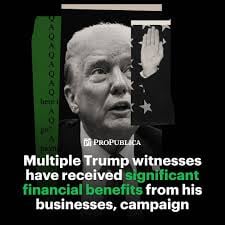
Nine witnesses in the criminal cases against former President Donald Trump have received significant financial benefits, including large raises from his campaign, severance packages, new jobs, and a grant of shares and cash from Trump’s media company.
The benefits have flowed from Trump’s businesses and campaign committees, according to a ProPublica analysis of public disclosures, court records and securities filings. One campaign aide had his average monthly pay double, from $26,000 to $53,500. Another employee got a $2 million severance package barring him from voluntarily cooperating with law enforcement. And one of the campaign’s top officials had her daughter hired onto the campaign staff, where she is now the fourth-highest-paid employee.
Get Our Top Investigations
Subscribe to the Big Story newsletter.
Email address:
These pay increases and other benefits often came at delicate moments in the legal proceedings against Trump. One aide who was given a plum position on the board of Trump’s social media company, for example, got the seat after he was subpoenaed but before he testified.
Significant changes to a staffer’s work situation, such as bonuses, pay raises, firings or promotions, can be evidence of a crime if they come outside the normal course of business. To prove witness tampering, prosecutors would need to show that perks or punishments were intended to influence testimony.
White-collar defense lawyers say the situation Trump finds himself in — in the dual role of defendant and boss of many of the people who are the primary witnesses to his alleged crimes — is not uncommon. Their standard advice is not to provide any unusual benefits or penalties to such employees. Ideally, decisions about employees slated to give evidence should be made by an independent body such as a board, not the boss who is under investigation.
Even if the perks were not intended to influence witnesses, they could prove troublesome for Trump in any future trials. Prosecutors could point to the benefits to undermine the credibility of those aides on the witness stand.
“It feels very shady, especially as you detect a pattern. … I would worry about it having a corrupt influence,” Barbara McQuade, a former U.S. attorney for the Eastern District of Michigan, said after hearing from ProPublica about benefits provided to potential Trump witnesses.
But McQuade said these cases are difficult to prove, even if the intent were actually to influence testimony, because savvy defendants don’t explicitly attach strings to the benefits and would more likely be “all wink and a nod, ‘You’re a great, loyal employee, here’s a raise.’”
In response to questions from ProPublica, a Trump campaign official said that any raises or other benefits provided to witnesses were the result of their taking on more work due to the campaign or his legal cases heating up, or because they took on new duties.
The official added that Trump himself isn’t involved in determining how much campaign staffers are paid, and that compensation is entirely delegated to the campaign’s top leaders. “The president is not involved in the decision-making process,” the official said. “I would argue Trump doesn’t know what we’re paid.”
Campaign spokesperson Steven Cheung said in a statement that “the 2024 Trump campaign is the most well-run and professional operation in political history. Any false assertion that we’re engaging in any type of behavior that may be regarded as tampering is absurd and completely fake.”
Trump’s attorney, David Warrington, sent ProPublica a cease-and-desist letter demanding this article not be published. The letter warned that if the outlet and its reporters “continue their reckless campaign of defamation, President Trump will evaluate all legal remedies.”
It’s possible the benefits are more widespread. Payments from Trump campaign committees are disclosed publicly, but the finances of his businesses are mostly private, so raises, bonuses and other payments from those entities are not typically disclosed.
ProPublica did not find evidence that Trump personally approved the pay increases or other benefits. But Trump famously keeps close watch over his operations and prides himself on penny-pinching. One former aide compared working for the Trump Organization, his large company, to “a small family business” where every employee “in some sense reports to Mr. Trump.” Former aides have said Trump demands unwavering loyalty from subordinates, even when their duties require independence. After his Attorney General Jeff Sessions decided to recuse himself against then-President Trump’s wishes, paving the way for a special counsel to investigate his campaign’s ties to Russia, Trump fumed about being crossed. “Where’s my Roy Cohn?” Trump asked, referring to the notorious former aide to Sen. Joseph McCarthy who later served as Trump’s faithful fixer long before Trump became president.
In addition to the New York case in which Trump was convicted last week, stemming from hidden payments to a porn star, Trump is facing separate charges federally and in Georgia for election interference and in another federal case for mishandling classified documents.
Attempts to exert undue influence on witnesses have been a repeated theme of Trump-related investigations and criminal cases over the years.
Trump’s former campaign manager and former campaign adviser were convicted on federal witness tampering charges in 2018 and 2019. The campaign adviser had told a witness to “do a ‘Frank Pentangeli,’” referencing a character in “The Godfather Part II” who lies to a Senate committee investigating organized crime. Trump later pardoned both men in the waning days of his presidency. (He did not pardon a co-defendant of the campaign manager who had cooperated with the government.)
During the congressional investigation into the storming of the Capitol on Jan. 6, 2021, a former White House staffer testified that she got a call from a colleague the night before an interview with investigators. The colleague told her Trump’s chief of staff “wants me to let you know that he knows you’re loyal and he knows you’ll do the right thing tomorrow and that you’re going to protect him and the boss.” (A spokesperson for the chief of staff denied that he tried to influence testimony.)
Last year, Trump himself publicly discouraged a witness from testifying in the Georgia case. Trump posted on social media that he had read about a Georgia politician who “will be testifying before the Fulton County Grand Jury. He shouldn’t.”
One witness has said publicly that, when he quit working for Trump in the midst of the classified documents criminal investigation, he was offered golf tournament tickets, a lawyer paid for by Trump and a new job that would have come with a raise. The witness, a valet and manager at Mar-a-Lago, had direct knowledge of the handling of the government documents at the club, the focus of one of the criminal cases against the former president. “I’m sure the boss would love to see you,” the employee, Brian Butler, recalled Trump’s property manager telling him. (The episode was first reported by CNN.)
In an interview with ProPublica, Butler, who declined the offers, said he looked at them “innocently for a while.” But when he added up the benefits plus the timing, he thought “it could be them trying to get me back in the circle.”
One Trump aide who plays a key role in multiple cases is a lawyer named Boris Epshteyn, who became an important figure in Trump’s effort to overturn the results of the 2020 election.
A college classmate of one of Trump’s sons who worked on the 2016 campaign and briefly in the White House, Epshteyn was involved in assembling sets of false electors around the country after Trump lost the 2020 election, and Epshteyn’s emails and texts have come up repeatedly in investigations.
In 2022, he testified before the Georgia grand jury that later indicted Trump on charges related to attempts to overturn the election. The FBI seized his phone, and in April 2023 he was interviewed by the federal special counsel.
In early August 2023, the special counsel charged Trump with conspiracy to defraud the United States and conspiracy to obstruct an official proceeding as part of an effort to overturn the 2020 election. A couple weeks later, the Georgia grand jury handed down an indictment accusing Trump of racketeering as part of a plot to overturn the election results in the state. From November 2022 to August 2023, the Trump campaign had paid Epshteyn’s company an average of $26,000 per month. The month after the indictments, his pay hit a new high, $50,000, and climbed in October to $53,500 per month, where it has remained ever since.
Epshteyn is a contractor with the campaign and the payments go to his company, Georgetown Advisory, which is based at a residential home in New Jersey. The company does not appear to have an office or other employees. Campaign filings say the payments are for “communications & legal consulting.”
Kenneth Notter, an attorney at MoloLamken who specializes in white-collar defense, said that a defendant should have a good explanation for a major increase in pay like Epshteyn’s. “Any change in treatment of a witness is something that gets my heart rate up as a lawyer.”
Already in early 2023, months before the pay bump, a Trump campaign spokesperson described Epshteyn to The New York Times as “a deeply valued member of the team” who had “done a terrific job shepherding the legal efforts fighting” the investigations of Trump. The Times reported then that Epshteyn spoke to Trump multiple times per day.
Timothy Parlatore, an attorney who left Trump’s defense team last year citing infighting, found Epshteyn’s large raise baffling. He questioned Epshteyn’s fitness to handle high-stakes criminal defense given his scant experience in the area. “He tries to coordinate all the legal efforts, which is a role he’s uniquely unqualified for,” Parlatore said.
The Trump campaign official told ProPublica that Epshteyn got a pay raise because Trump’s legal cases intensified and, as a result, Epshteyn had more legal work to coordinate. The official declined to say if he started working more hours: “All of us are working 24/7, ... every second of the day.” Epshteyn declined to comment on the record.
Even after the major pay increase, Epshteyn has not devoted all of his working time to the Trump campaign. He has continued to consult for other campaigns in recent months, disclosure filings show. And in November, he got a new role as managing director of a financial services firm in New York called Kenmar Securities, regulatory filings show.
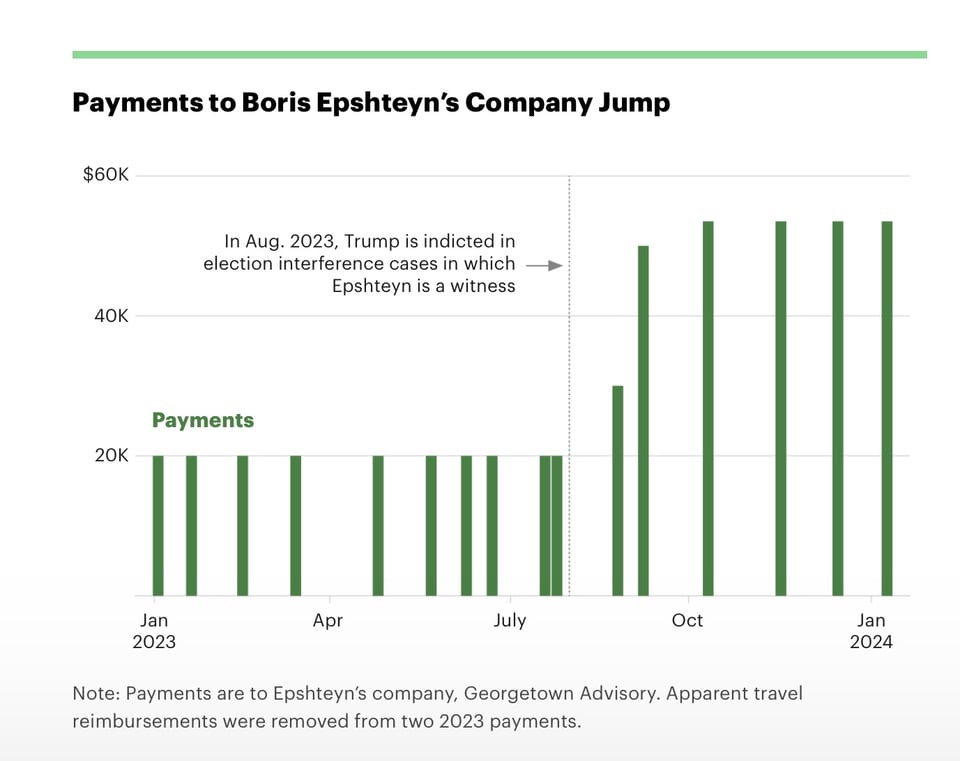
Other employees in Trump’s political orbit have followed a similar pattern — including his top aide.
Trump campaign head Susie Wiles, a Florida political consultant, was present when Trump allegedly went beyond improperly holding onto classified documents and showed them to people lacking proper security clearances.
When Trump was indicted on June 8, 2023, over his handling of the documents, the indictment described Wiles as a “PAC representative.” It described Trump allegedly showing her a classified map related to a military operation, acknowledging “that he should not be showing it” and warning her to “not get too close.”
That June, Right Coast Strategies, the political consulting firm Wiles founded, received its highest-ever monthly payment from the Trump campaign: $75,000, an amount the firm has equaled only once since.
Wiles had been a grand jury witness before the indictment. News reports indicated Wiles had told others that she continued to be loyal to Trump and only testified because she was forced to. (And, according to Wiles, Trump was told she was a witness sometime before the indictment’s June release.)
The Trump campaign official told ProPublica that the spike in payments was largely because Wiles was billing for previous months.
She also got a 20% raise that May, from $25,000 to $30,000 per month. “She went back and redid her contract,” the official said, adding that her role as a witness was not a factor in that raise.
A few months later, the Wiles family got more good news. Wiles’ daughter Caroline, who had done some work for Trump’s first campaign and in the White House, where she reportedly left one job because she didn’t pass a background check, was hired by his campaign. Her salary: $222,000, making her currently the fourth-highest-paid staffer. (The Trump campaign official said her salary included a monthly housing stipend.)
Susie Wiles said she and another campaign official were responsible for hiring her daughter, who she said has an expertise in logistics and was brought on to handle arrangements for surrogates taking Trump’s place at events he couldn’t attend. Wiles said Trump wasn’t involved in the hire.
Caroline Wiles told ProPublica her mother’s position in the campaign played no role in her getting a job, but she declined to describe the circumstances around the job offer. “How did I get the job? Because I have earned it,” she said. “I don’t think it has anything to do with Susie.”
The indictment suggests Susie Wiles herself has been aware of efforts to keep potential witnesses in the fold. Soon after the FBI found classified documents at Mar-a-Lago, a Trump employee was asked in a group text chat that included Wiles to confirm that the club’s property manager “was loyal.”
Wiles told ProPublica she couldn’t talk about the details of the case, but she called the text message exchange “a nothing.”
More generally, she said she was unaware of the need to ensure employees who are witnesses do not appear to be receiving special treatment. “It’s the first time I’ve heard that’s best practice,” she said. “I don’t mind telling you I conduct myself in such a way that I don’t worry about any of that.” Trump, she said, had never talked to her about her role as a witness.
Less powerful aides who are witnesses have also enjoyed career advances.
Margo Martin, a Trump aide who, like Wiles, allegedly witnessed Trump showing off what he described as a secret military document, got a significant raise not long after the classified documents case heated up with the search at Mar-a-Lago.
According to the indictment, Trump told Martin and others the military plan was “secret” and “highly confidential.” “As president I could have declassified it,” he allegedly told the group. “Now I can’t, you know, but this is still a secret.”
A few months before her grand jury appearance, she moved from the payroll of a Trump political committee to a job with the campaign as it was launching. Martin was given a roughly 20% pay raise, from $155,000 to $185,000 per year, according to the Trump campaign. Campaign finance filings show a much larger pay increase for Martin, but the Trump campaign said the filings are misleading because of a difference in how payroll taxes and withholdings are reported by the two committees.
Because of that quirk, it’s impossible to know who else got raises and how big they were. The campaign official said that at least one other witness also got a pay raise but did not provide details about how much and when.
Dan Scavino is a longtime communications aide who Trump once called the “most powerful man in politics” because he could post for Trump on the president’s social media accounts. Scavino was among the small group of staff who had an up-close view of Trump during the final weeks of his presidency — a focus of the congressional inquiry into the Jan. 6 insurrection and the criminal probe into election interference.
In August 2021, a month after the congressional investigation began, securities filings show that the parent company behind Truth Social, Trump’s social media company, gave Scavino a consulting deal that ultimately paid out $240,000 a year.
The next month, lawmakers issued a subpoena to Scavino to ask him what the White House knew about the potential for violence before the attacks and what actions Trump took to try to overturn the election results. The panel gave Scavino a half-dozen extensions while negotiating with him, but he ultimately refused to testify or turn over documents and was held in contempt.
In September 2022, Scavino received a subpoena to testify before the criminal grand jury in the federal election interference probe. This time, he wasn’t able to get out of it and was seen leaving the Washington, D.C., courthouse in May 2023.
Bits of Scavino’s testimony were reported by ABC News, citing unnamed sources. Though his recollections of Trump from Jan. 6 painted the former president unfavorably, his reported testimony didn’t include significant new information. He testified Trump was “very angry” that day, and, despite pleas from aides to calm the Capitol rioters, Trump for hours “was just not interested” in taking action to stop it. When the testimony was reported, Trump’s spokesperson said Scavino is one of the former president’s “most loyal allies, and his actual testimony shows just how strong President Trump is positioned in this case.”
Between getting the subpoena and testifying, Scavino was given a seat on the board of the Trump social media company.
Scavino was also granted a $600,000 retention bonus and a $4 million “executive promissory note” paid in shares, according to SEC filings. The company’s public filings do not make clear when these deals were put in place.
As one of the few aides who Trump was with on Jan. 6, Scavino is likely to be called if Trump’s election interference cases go to trial.
Reached by ProPublica, Scavino declined to answer questions about how he got the board seat and other benefits from the Trump media company. “It has nothing to do,” he said, “with any investigation.”
A Trump Media spokesperson declined to answer questions about who made the decision to give Scavino the benefits and why, but said, “It appears this article will comprise utterly false insinuations.”
When Atlanta attorney Jennifer Little was hired to represent Trump in his Georgia election interference case, it marked the high point of her career.
A former local prosecutor who started her own practice, she had previously taken on far more modest cases. Highlights on her website include a biker who fell because of a pothole, a child investigated for insensitive social media comments and drunk drivers with “DUI’s as high as .19.” Little had made headlines for some higher profile cases, like a candidate for lieutenant governor accused of sexual harassment, but everything on her resume paled in comparison to representing a former president accused of plotting to reverse the outcome of an election.
Then in May 2022, her job got even more complicated when Trump pulled her into his brewing showdown with the Justice Department over classified documents at Mar-a-Lago. Despite multiple requests, Trump had not returned all of the documents he had brought with him from the White House to his Florida club. The Justice Department had just elevated the matter by subpoenaing Trump for the records, and Trump wanted her advice.
Little told him, according to news reports, that unlike the government’s prior requests, a subpoena meant he could face criminal charges if he didn’t comply.
When Trump ultimately did not turn over the records and the criminal investigation intensified, Little’s involvement in that pivotal meeting got her called before a grand jury by federal prosecutors.
Some of her testimony before that grand jury, which determines whether someone will be indicted, may have been favorable for Trump. In one reported instance, Little’s recollections undermined contemporaneous documentary evidence that was damaging to Trump. Investigators had obtained notes from another lawyer at the May 2022 meeting indicating Trump suggested they not “play ball” with federal authorities: “Wouldn’t it be better if we just told them we don’t have anything here?”
Little told the grand jury she remembered the question more benignly, according to an ABC News story that cited anonymous sources, and said she couldn’t recall Trump recommending they not “play ball.”
Trump has since been indicted over his handling of the classified documents. If the case goes to trial, Little’s testimony could prove crucial as the two sides try to make their case about Trump's consciousness of guilt and whether he purposely withheld documents. (Trump has pleaded not guilty in that case and has said he did nothing wrong.)
Just after Little was forced to testify before the grand jury in March 2023, a Trump political action committee paid her $218,000, by far the largest payment she’d received while working for Trump. In the year after she became a witness, she has made at least $1.3 million from the Trump political committee, more than twice as much as she had during the year prior.
Little told ProPublica the large payment she received soon after she was compelled to testify was due to a lengthy motion she filed around then to block the release of the Georgia grand jury’s findings and prevent Trump from being indicted. Her hourly rate did not change, she said, the workload increased. The elevated payments in the year after she became a witness did coincide with the Georgia case heating up and Trump getting indicted.
The Trump campaign official said the spike in payments to Little after she became a witness was the result of her billing for multiple time periods at once.
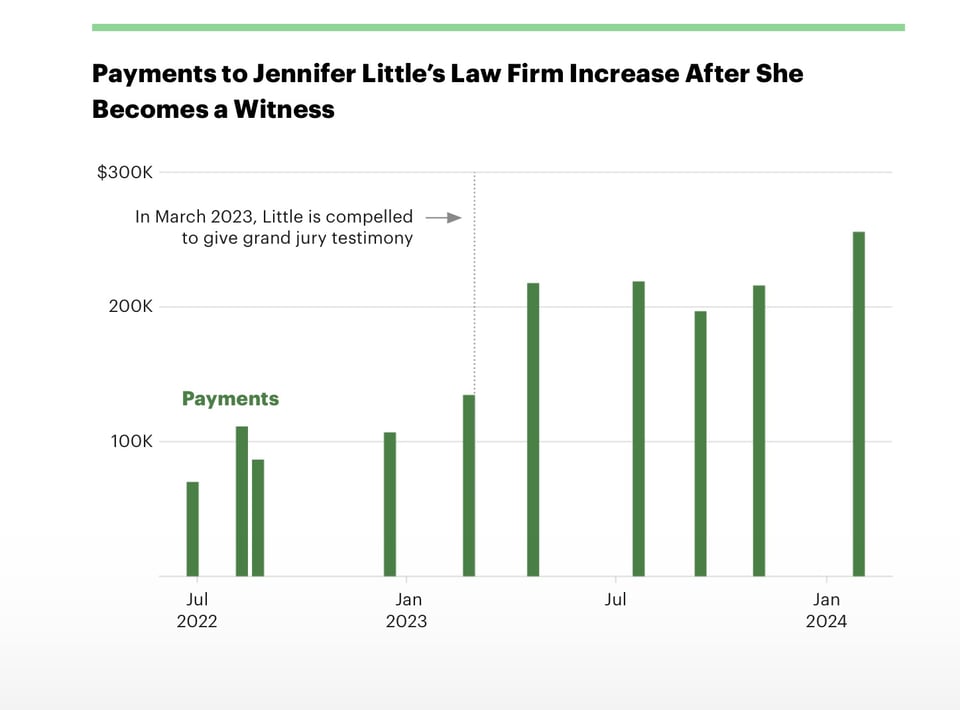
A similar pattern played out for the other Trump lawyer present at the Mar-a-Lago meeting about the subpoena.
Evan Corcoran, a former federal prosecutor who specializes in white-collar criminal defense, was new to the team at the time. And it was his notes, obtained by investigators, that memorialized Trump suggesting they not “play ball.” His notes also included a description of Trump seeming to instruct him to withhold some sensitive documents from authorities when the former president made a “plucking motion.”
“He made a funny motion as though — well okay why don’t you take them with you to your hotel room and if there’s anything really bad in there, like, you know, pluck it out,” Corcoran’s notes read, according to the indictment.
Like Little, Corcoran tried to fight being forced to testify before a grand jury, asserting that as Trump’s lawyer, their communications were protected. But prosecutors were able to convince a judge that the protection didn’t apply because their legal advice was used to commit crimes.
Corcoran’s notes from his conversations with Trump formed the backbone of the eventual indictment, and his descriptions of those meetings are expected to be a critical component at trial. The lawyer made an initial appearance before the grand jury in January 2023 and appeared again in another session in March.
Around the time he was forced to be a witness, Corcoran recused himself from the classified documents case, but he continued to represent Trump on other matters. Nevertheless his firm’s compensation shot up for a few months.
Just days after his March grand jury testimony, the Trump campaign sent two payments to his firm totaling $786,000, the largest amount paid in a single day in his almost two years working for Trump. The firm brought in a total of $1.4 million in that four-week span, more than double its payments from any other comparable period during Corcoran’s time working for Trump.
Corcoran did not respond to questions from ProPublica. The Trump campaign official said the spike in payments came because the firm was billing for more hours of work as Trump’s cases ramped up. The official added that the number of lawyers from the firm working on the case may have increased but could not provide specifics.
AThe issue of witnesses who have received financial rewards from Trump has already come up at both of the former president’s New York trials.
In the civil fraud case last year, prosecutors questioned the Trump Organization’s former controller about the $500,000 in severance he had been promised after retiring earlier in the year. During his testimony, the former controller broke down in tears as he complained about allegations against an employer he loved and defended the valuations at the center of the case as “justified.” At the time of the testimony, he was still receiving his severance in installments.
Former chief financial officer Allen Weisselberg got a $2 million severance agreement in January 2023, four months after the New York attorney general sued Trump for financial fraud in his real estate business. The agreement contains a nondisparagement clause and language barring Weisselberg from voluntarily cooperating with investigators.
It came up in Trump’s hush money trial last month when prosecutors told the judge that the severance agreement was one of the reasons they would not call Weisselberg . He was still due several payments.
“The agreement seems to preclude us from talking to him or him talking to us at the risk of losing $750,000 of outstanding severance pay,” one prosecutor said.
In last year’s fraud trial, the judge wrote of the severance agreement, “The Trump Organization keeps Weisselberg on a short leash, and it shows.”
A Trump Organization spokesperson said in a statement that after Weisselberg and the controller announced their retirement plans, “the company agreed to pay them severance based on the number of years they worked at the company. President Trump played no role in that decision.” Weisselberg’s severance agreement was signed by Trump’s son Eric.
Another witness from the civil trial last year, longtime Trump friend and real estate executive Steve Witkoff, was called as an expert witness by Trump’s defense team, and he defended the Trump Organization real estate valuations at the heart of the case.
For the Women Who Accused the Trump Campaign of Harassment, It’s Been More Harassment
Two months after Witkoff’s testimony, Trump’s campaign for the first time started paying his company, the Witkoff Group, for air travel. The payments continued over several weeks, ultimately totalling more than $370,000.
The Trump campaign official confirmed the campaign used Witkoff’s private jet for multiple trips, including Trump’s visit to a stretch of the Texas border in February, saying it “appropriately reimbursed” him for the flights. The official said it sometimes used commercial charter jet services but opted for Witkoff’s plane because of “availability, space, and convenience.”
Witkoff and The Witkoff Group did not respond to requests for comment. (Pro Publica).
A few more things.
The truest words Bill Maher ever said. Touch to watch. 👇
“Their big talking point is: ‘If they do it to me, this could happen to anyone.’
— Republicans against Trump (@RpsAgainstTrump) June 1, 2024
I’ll have to remember that next time I’m cheating on my third wife with a porn star and pay her off when I’m running for president.” 🤣🤣
pic.twitter.com/5fcuw1azqw
If you have 6 minutes, watch and listen to Margaret Atwood’s Democracy 2024.👇
Mexico’s new President is a woman, Jewish, a climate scientist, and there is so much work to do.
Mexico’s New President Has a Daunting Job: Stop the Blood Bath.
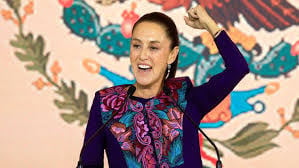
In a village in the hills of Guerrero State, residents ran from their home as drones flew overhead, dropping makeshift bombs. For months, drug cartel operatives had been deploying the commercial devices to drop explosives packed into metal casings, setting homes ablaze, tearing holes in walls and sending piercing hot shrapnel into people’s flesh.
Traveling to the state, in southern Mexico, in March, I visited some of those villages and met people who had packed their possessions into pickup trucks and fled the terror. And while the drone attacks are a dark new advance, they are just one example of the violence that has raged across Mexico every day for almost two decades of intense cartel warfare, leaving hundreds of thousands of Mexicans displaced, murdered or disappeared.
This violence is the most formidable challenge that Claudia Sheinbaum, whom the nation has just elected by a huge margin to be its first female president, will have to confront when she takes power in October. And yet she has not laid out a clear strategy to govern a country that is bathed in blood, scarred with mass graves in cow fields and garbage dumps. Ms. Sheinbaum will be in charge of a nation plagued by over 30,000 murders a year, 90 percent of which go unsolved, and she will have to face the powerful cartels behind those numbers, which are now networks of paramilitary organized crime and deeply embedded in communities. Today, these groups not only traffic drugs like fentanyl but also run a portfolio of crimes from human smuggling to widespread extortion.
The run-up to the election was one of the most violent campaigns in Mexico’s recent history. Dozens of candidates were killed; a gunman shot a contender for mayor as he shook hands with supporters on a basketball court. Ms. Sheinbaum did not put this bloodshed at the core of her campaign. A 61-year-old environmental engineer and a member of the governing Morena party, Ms. Sheinbaum won the vote on promises to continue social programs of the current president, her mentor Andrés Manuel López Obrador, known as AMLO. She floated interesting proposals on renewable energy and confronting water shortages.
Her lack of a strong public vision for Mexico’s security is concerning, given that her three predecessors all failed on this front. Felipe Calderón took power in 2006 and headed a military crackdown on cartels, but violence only escalated; his security secretary was later convicted in New York of cocaine trafficking. From 2012 to 2018, Enrique Peña Nieto tried to change the narrative and talk about Mexico’s economic potential, but violence also worsened on his watch. During his tenure, 43 students disappeared while in the custody of police officers linked to a cartel. And AMLO has been mocked for his call to deal with cartels through “hugs, not bullets,” while presiding over the most violent period in Mexico’s recent history.
All that said, Ms. Sheinbaum has shown she can take a pragmatic approach to crime. As mayor of Mexico City from 2018 to 2023, she flooded the city with security cameras and deployed the police in certain high-crime areas. Murders dropped by about half in the city during her tenure, according to official statistics. The opposition candidate Xóchitl Gálvez has claimed Ms. Sheinbaum manipulated those figures to hide homicides, and there is a legitimate debate on the true death toll of cartel violence across Mexico. But today, people in the capital feel markedly safer.
Of course, controlling crime levels in a single city is different from facing the sprawling national crisis that in some states resembles a full-blown war. In states like Zacatecas and Michoacán, squads of cartel gunmen roll though towns in convoys flashing their Kalashnikovs, blocking roads and using improvised explosive devices and rocket-propelled grenades. Hidden graves dot the country, hiding victims ranging from cartel operatives killed by rivals to innocent people who crossed the wrong gangsters. Most likely the largest mass grave discovered so far, found in 2016 in the southeastern state of Veracruz, contained almost 300 skulls.
Most people would love to end this war, stop the impunity with which the cartels operate and fix the endemic corruption in the security forces. These are herculean problems that will take years to overcome. Ms. Sheinbaum should take the same practical approach she used in Mexico City: pursuing concrete goals that could at least reduce the violence and turn a national security crisis into a more manageable problem of public safety.
To do so, the new president should prioritize going after the most violent players, including certain cartel commanders and squads of killers in the most homicidal areas of the country. Mexican security forces cannot take down all cartels at once, and major drug traffickers are easily replaced by others hungry for the huge profits. But consistently targeting the most lethal players could reduce the body count and make other traffickers less keen to unleash mass murder.
Ms. Sheinbaum also needs a strong campaign to fight the rampant extortion that is ravaging the lives of many hardworking Mexicans. If she targets extortion, she will win support from businesses large and small, and it will help the economy.
Finally, Ms. Sheinbaum needs to create an effective prevention program aimed at the young people recruited by cartels. As I wrote in my book in 2021, a veteran with the infamous Barrio Azteca gang, which operates in Ciudad Juárez, told me back in 2017 how his gang looked for angry, abandoned youths to join the organization. “The kids who have been mistreated by their parents, they have a cold look, and those are people that are useful for the job,” he said. “They make for the good bad guys.”
Both Mr. Peña Nieto and AMLO talked about this idea but failed to devise any truly effective policy. AMLO’s scholarship program for high school students, which aims to keep teenagers in education, is a good start, but it can miss the young people who are most likely to join the cartels. A more constructive program has to be more laser-focused on the most troubled youths in the most violent areas. Mexico already has gifted social workers on the ground who could do this work if they had the resources.
Even incremental progress would go a long way. If Ms. Sheinbaum’s government can slash the level of murders by even a third, people can start to feel safer. If there are fewer homicides, investigators will be less flooded by cases, and more can be solved. If more people denounce extortion, others may be emboldened to do so.
On the other hand, judging from the violence in Mexico over the past two decades, things could easily get worse. And if Mexico’s reformist presidents continue to fail to fight crime, a more radical contender could come along, promising security at a very high cost, including a total decimation of human rights. (New York Times).
_________________________________________________
One helleva champion.
Simone Biles cruises to 9th national title https://t.co/cOvNbLqhSl
— 12 On Your Side WWBT Richmond (@12OnYourSide) June 3, 2024

_________________________________________________
Vote on Day 1.

New York Primary voting starts on June 15.
. . .
Today is Primary Day in New Jersey.
_________________________________________________